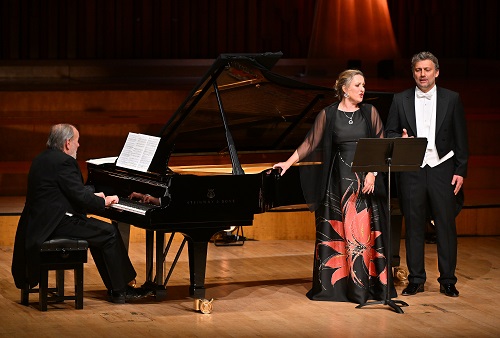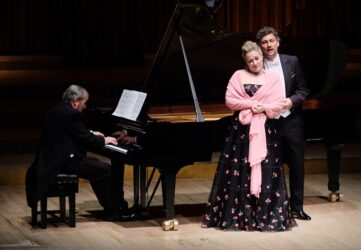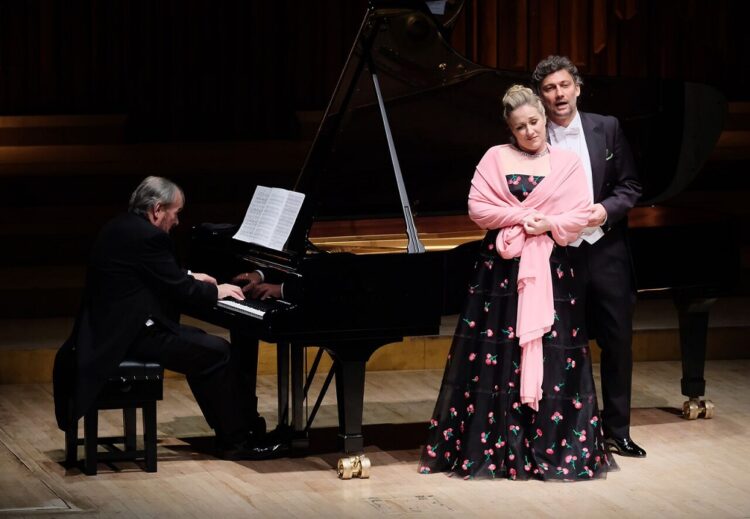 United Kingdom Schumann, Brahms: Diana Damrau (soprano), Jonas Kaufmann (tenor), Helmut Deutsch (piano). Barbican Hall, London, 29.3.2022. (MB)
United Kingdom Schumann, Brahms: Diana Damrau (soprano), Jonas Kaufmann (tenor), Helmut Deutsch (piano). Barbican Hall, London, 29.3.2022. (MB)

Schumann: ‘Widmung’ Op.25 No.1; ‘Jemand’ Op.25 No.4; ‘Geständnis’ Op.74 No.7; ‘Resignation’ Op.83 No.1; ‘Liebeslied’ Op.51 No.5; ‘Stille Tränen’ Op.35 No.10
Brahms: ‘Verzagen’ Op.72 No.4; ‘Waldeseinsamkeit’ Op.85 No.6; ‘Nachtigall’ Op.97 No.1; ‘Ach, wende diesen Blick’ Op.57 No.4; ‘Es träumte mir’ Op.57 No.3; ‘Meerfahrt’ Op.96 No.4; ‘Anklänge’ Op.7 No.3
Schumann: ‘In der Nacht’ Op.74 No.4; ‘Tragödie’ Op.64 No.3; ‘An den Abendstern’, Op.103 No.4
Brahms: ‘Vergebliches Ständchen’ Op.84 No.4; ‘Serenade’ Op.70 No.3; ‘Therese’ Op.86 No.1; ‘O komme, holde Sommernacht’ Op.58 No.4; ‘Geheimnis’ Op.71 No.3; ‘Wir wandelten’ Op.86 No.2
Schumann: ‘Er und sie’ Op.78 No.2; ‘Mein schooner Stern’ Op.101 No.4; ‘Lied der Suleika’ Op.25 No.9; ‘Ihre Stimme’ Op.96 No.3; ‘Liebster, deine Worte’ Op.101 No.2; ‘Lehn’ deine Wang an meine Wang’ Op.142 No.2; ‘Verratene Liebe’ Op.40 No.5
Brahms: ‘Weg der Liebe’ Op.20 No.2; ‘An die Tauben’ Op.63 No.4; ‘Die Liebende schreibt’ Op.47 No.5; ‘Sehnsucht’ Op.14 No.8; ‘Meine Liebe ist grün’ Op.63 No.5; ‘Versunken’ Op.86 No.5; ‘Von ewiger Liebe’ Op.43 No.1; ‘Boten der Liebe’ Op.61 No.4
Here was a rich — and richly varied — programme of songs and duets by Schumann and Brahms, which gained almost as much strength from intelligent programming, dividing the performances into two halves, and three single-composer groups within each half, as through the musical contributions of Diana Damrau, Jonas Kaufmann, and Helmut Deutsch. Broadly speaking, the second half was lighter than the first, though each traced its own dramatic path, drawing on the strengths of both singers as actors as well as singers. That is something frowned upon by the more severe of Lieder purists — do they really think opera and song should be separated by a chasm? — but which lent the evening its own particular, enchanting character.
The opening few Schumann songs set the scene for what was to come, Kaufmann immediately ardent and imploring in ‘Widmung’, Damrau’s ‘Jemund’ a finely judged response, characterful without tweeness, Kaufmann’s ‘Geständnis’ in turn following on, and so on. There was much, yet never too much, stage interaction, and Deutsch subtly had Schumann’s harmonies tell tales similar yet never identical to those told with words. I loved the unexaggerated, heartfelt dilemma Damrau outlined in ‘Liebeslied’, bringing us to Kaufmann’s conclusion to this group, a ‘Stille Tränen’, in which the world’s heart skipped a beat or two. Almost an aria, yet never leaving the realm of song, the performance benefited from Deutsch’s grand, almost Lisztian manner. Nothing was taken for granted, each song and its position within the whole thought out.
Turning to Brahms, the tumult of ‘Verzagen’, vividly portrayed by Damrau and Deutsch, set the scene for keen storytelling (a haunted Kaufmann ‘In Waldeseinsamkeit’), ardent nostalgia with a refreshing bite (Damrau’s ‘Nachtigall’) and much more. True, there was strain on Kaufmann’s voice at times, such as would not once have been the case. If that lessened the impact of his performances to some, it is a pity, but surely the way he built a song such as ‘Meerfahrt’ was ample compensation; likewise, the particular qualities of a voice that seems to have headed into falsetto, yet which is revealed to be simply part of a spectrum of many colours, leading down to that celebrated, baritonal base. There was a special magic when the two voices finally came together in Schumann’s ‘In der Nacht’, itself helping prepare for the exchanges of ‘Tragödie’: first Kaufmann’s vulnerable masculinity, then Damrau’s killing our hopes and expectations, and then both together in the final of its three songs, laced with a generous helping of Romantic irony. ‘An den Abendstern’ functioned as beautiful pendant and harbinger of new paths.
Our artists set a different initial tone for the second half: lighter, yet with fine distinctions of colour, in a humorous account of ‘Vergebliches Ständchen’. If the following Kaufmann ‘Serenade’ were darker, one nonetheless heard that in new light. There was altogether a post-Mozartian sensibility to many of these songs, doubtless drawing on long stage as well as hall experience and all the stronger for that. The romantic — and Romantic — intertwining of lines in Schumann’s ‘Er und sie’, followed by Kaufmann’s incorrigibly seductive ‘Mein schooner Stern’ and Damrau’s lightly worn longing in the Goethe setting ‘Lied der Suleika’ — what verse! — led us to the end of that set and beyond, to the first of the next.

There, in Brahms’s ‘Weg der Liebe’, we heard the truest of duets, a fine sense of fulfilment as voices came together once more, with a hint or two, never overwhelming, of that operatic experience too. Damrau’s soaring, exultant ‘Meine Liebe ist grün’, set against typically Brahmsian shadows in the piano, set up expectations for the next-but-one ‘Von ewiger Liebe’. Kaufmann there took the audience in the palm of his hand, his singing as beautiful as anything from fifteen years ago, Damrau every inch his equal, both voices and piano contributing to a deeply cumulative experience. ‘Die Boten der Liebe’ made for a splendid foil, like a buffa duet in previously mentioned post-Mozart spirit. Schumann’s ‘Unterm Fenster’ came as well-chosen encore.
Mark Berry
